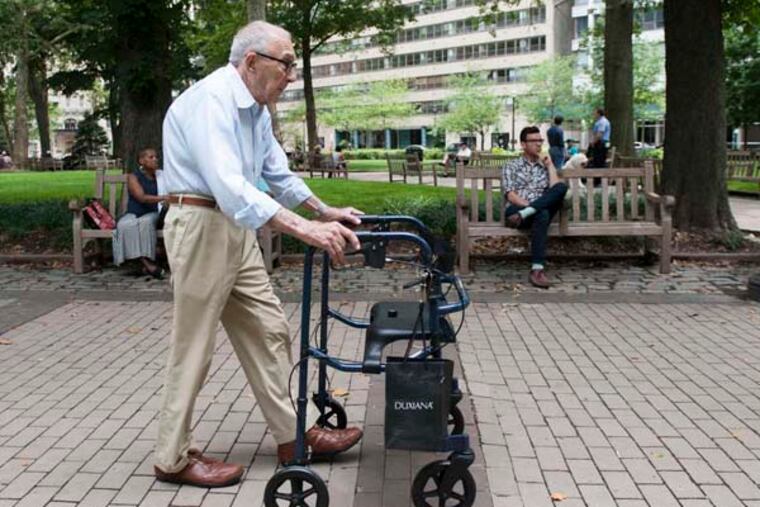Philadelphia’s aging population needs help fighting loneliness | Opinion
As the population ages, both families and community leaders need to do more to combat loneliness and social isolation.

Loneliness may have the same impact on mortality as smoking 15 cigarettes a day, making it even more dangerous to health than obesity. Recent nationwide studies highlight the close relationship between social isolation and loneliness and serious health problems — memory loss, depression, self-neglect, changes in blood pressure, medication errors, decline in functional status, poor management of everyday living tasks — as well as greater mortality.
Social ties provide support during illness, encourage people to maintain better health habits, and have positive effects on the immune system. Isolation from others contributes heavily to illness burden and premature death in at-risk populations.
Importantly, a recent Pew Research Center study notes that social isolation and loneliness are already significant for the more than eight million vulnerable older adults across the nation.
Why is this especially significant for Philadelphia? The population here is aging rapidly. Eighteen percent (~217,577) of our adult residents are age 65 or above, and of these, 43% (~93,446) live alone, according to an analysis from the Philadelphia Corporation for Aging. Without action, the consequences of social isolation and loneliness will escalate as Philadelphia ages.
Philadelphia can do much more to combat the loneliness and isolation that is especially acute among older adults. There are many examples in Europe and elsewhere that we could follow. For example, the British government recently appointed a Minister for Loneliness. On a smaller scale, the city of Porto in Portugal runs a home-matching program where students can obtain free housing with older adults who have the room and the older adults gain companionship.
One of the major health challenges facing us as a city is to develop equally innovative ways of combating the issue of loneliness. There are already solutions in this city. For instance, small, trusted nonprofits are playing a role. Here are three resources Philadelphians can access, and the types of clients they serve:
Penn’s Village: Joan is a Penn’s Village member in her late 80s living alone and in poor health. John, a volunteer, calls daily to check on how she’s doing or whether she is back in the hospital. He passes on information to two other volunteers who regularly visit Joan. This is one of the volunteer services of Penn’s Village, a community-based membership organization in Central Philadelphia that I direct. For 12 years, the program has brought older adults together to socialize, inform, and educate, and encourage connection and engagement with neighbors. Volunteers also drive members to medical appointments, buy groceries, and provide routine home repairs and IT support.
Ralston Center: Burt has progressive neurological problems and hearing loss that make daily activities challenging. Jaime is his caregiver at Ralston My Way. Burt reflects on their bond: “I don’t know how to be an older person who needs to be taken care of. Jaime is a young person with a young outlook. When I am with him, I feel younger. Our relationship has become a partnership. Jaime really listens to me.” Ralston Center provides supportive services and programs to older adults in West and Northwest Philadelphia so they can live independently and with dignity in their homes and communities as they age. The center offers home care, including overnight and live-in options, along with fitness classes and education sessions, yardwork, and transportation.
Supportive Older Women’s Network: Ruth, a 78-year-old widow whose son had just died, came to a group meeting and picked a chair apart from the other members. SOWN’s facilitator respected her need for space. At the next meeting, the facilitator repeatedly acknowledged Ruth’s contributions. Slowly, her confidence bloomed as did her interaction with others. She now says, “After my husband and son died, I could not see how to go on living. But here at SOWN, I can share my most private thoughts and feel better. I wouldn’t trade this program for anything.” SOWN provides peer support groups for older women at 20 sites in Philadelphia, weekly telehealth support groups for homebound women and caregivers, and support services for grandparents.
As the population ages, both families and community leaders need to do more to combat loneliness and social isolation. We need to watch out for our older family members and friends and hold the appropriate elected and appointed officials accountable for progress — or lack thereof — in supporting the vulnerable elderly.
Jane Eleey is the executive director of Penn’s Village, a nonprofit. jane@pennsvillage.org